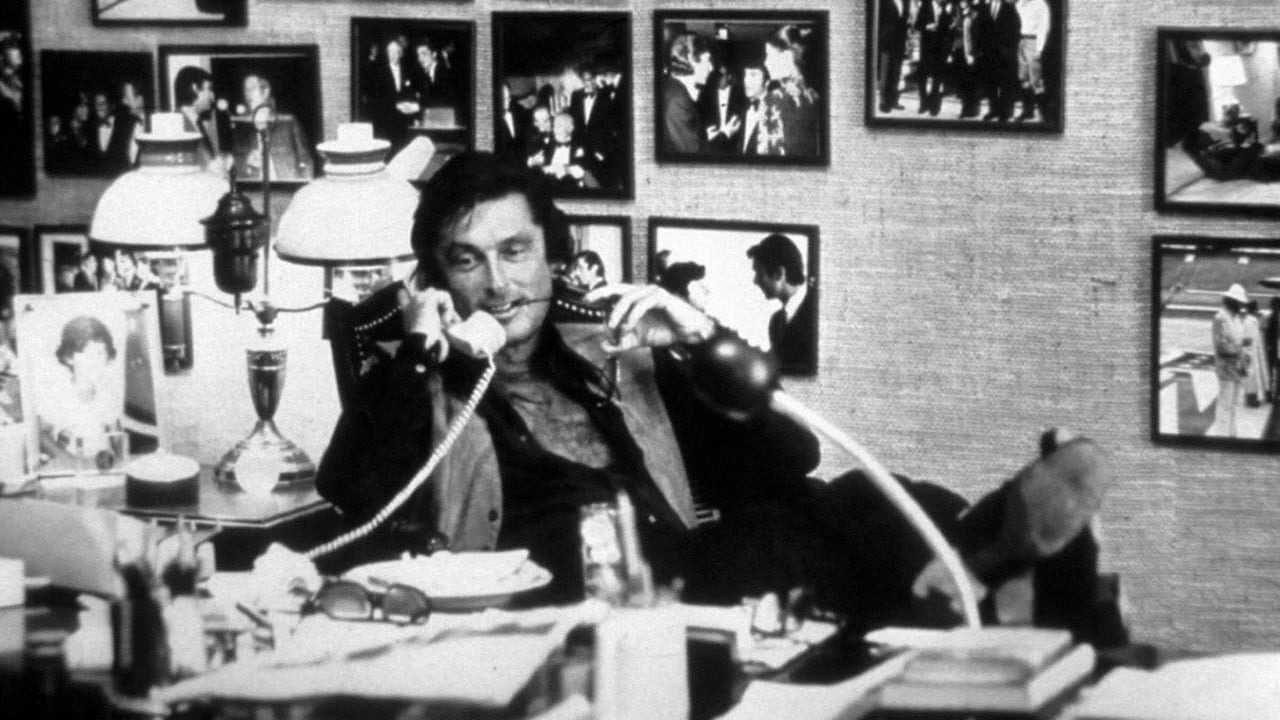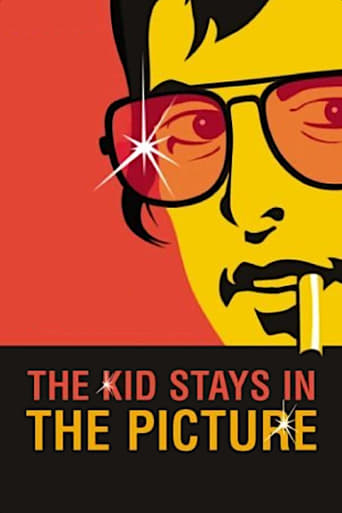

Well, according to this biographical documentary, the producer Robert Evans has lived the life of an elevator, or maybe a toilet seat, with a couple of truly good highs -- "Marathon Man," "Chinatown," and others -- and some down periods involving cocaine, murder, and the loss of his beloved mansion in Woodland Hills.It's based on Evans' own autobiography, and he narrates this doc. One might expect it to be filled with self justification, along the lines of, "Yes, I brought suit and left him destitute but it was never about the money." Instead, he's pretty generous with praise for his pals and surprisingly "understanding" towards those who have brought him down.I put quotes around the word "understanding" because what I mean is that he doesn't heap his calumny upon his undoers. He leaves them pretty much blameless. But I don't believe for a moment he "understands" them, or if he does he's not being frank about it. His wife, Ali McGraw, didn't leave him for Steve McQueen because Evans stayed away from home too long while working. No respectable Hollywood producer would include such a hoary cliché in a movie, unless John Wayne was the hero. How about, "You're married to your job"? As Evans himself says in the narrative, "I was never psychiatrically oriented." Evans seems to have a decent sense of humor about himself. He can poke fun at his early acting efforts. Once you've achieved great success, you're at liberty to do that. If Picasso had once been a bicycle repairman he might have joked about how bad he was. Yet the role distance is there, even though Evans' narration undermines it with an excess of dramatization. There may always be tragedy just around the corner, but when you're hearing Evans tell you this in a voice that sounds like Rock Hudson's after chain smoking two packs of Gauloise, it remains less than convincing.The images reflect the volatility of his career, as does the music. At his height, living in his mansion, accepting awards, dating models, being interviewed while wearing a pair of tinted glasses whose color matches the tint of the pullover sweater he chose to wear that day, the cuts arrive con brio. Later, during the dark years of the late 1980s, the music turns mournful and melancholic, and there are dismal shots of Evans' deserted swimming pool with maple leaves scattered across the surface like Evans' wasted dreams, like his hundred-dollar bills.Some of it is not entirely believable. Depressed, Evans checks himself into some sort of sanatorium. He describes himself as being "behind bars" and his room is "like a cell." He relates the story of his close escape from the "goons" that guarded the hallway. (He was picked up by his chauffeur.) What the hell is this -- The Betty Ford Clinic or The Snake Pit? He's a perceptive guy, no question about it, and had a string of good luck too. Life, though, has left him battered. The epilogue suggests he's made a successful comeback with movies like "Jade" and "Sliver." That's arguable. But, to be perfectly honest, despite the suffering Evans has endured and now put on display, I'd have traded places with him at any point in his life and so would anyone else.
... View MoreI was half way through with the new Hollywood issue of Vanity Fair when I came across the excerpt from Robert Evans new memoir "Kid Nortorius." I had not heard of Robert Evans, but was fascinated enough to get a copy of "The Kid Stays in the Picture" to learn more.I was glued to the tube watching the story of a man who had the incredible luck to get noticed. You all know the story of how some actress was discovered selling malteds in some drugstore. Evan was put into The Sun Also Rises. Both cast and crew, Ernest Hemingway, Tyrone Power, and Ava Gardner included, attempted to have Robert Evans fired during production. Producer Darryl F. Zanuck refused, saying, "The kid stays in the picture," thus leading to both Evans' long career as a producer and the title of his book, and this film.He knew he had no future as an actor, but he also knew that the power was in producing. he managed to get named a Vice President of Paramount in another stroke of luck. Then his talent took over and he is the man behind such memorable films as Rosemary's Baby, Love Story, The Godfather, Marathon Man, and his first as an independent producer, Chinatown. It is the story behind these films that is fascinating, especially the fact that he and Paramount were in on Love Story and The Godfather from the beginning - before they were even written! His story with directors Roman Polanski and Francis Coppola are equally fascinating.His own Love story with Ali McGraw is equally fascinating, though it ended in tragedy. But luck does a strange turn and tragedy really struck in the form of a Hollywood murder case where his name was mentioned. Not a suspect, just on the periphery, but it was enough to send him to the depths of hell - within a hair's breadth of suicide.It was his friends that brought him back to where he is today. Now, he is telling the rest of the story in a new Memoir, "Kid Nortorious".If you love films as I do, then you really need to see this one to provide a back story to some of your favorites. hey, you probably should be buying his books as well.
... View MoreRobert Evans's book version of this documentary, The Kid Stays in the Picture, is still un-read by me. But I have read much about him from other movie books from the 70's, and so this film does illuminate certain aspects of him that I already knew- his huge ego, his drug addiction, his proclivity to lots and lots of women, and having some part in the more outstanding films of the 1970's. Sometimes with Evans himself narrating throughout two things become apparent as peculiarities that keep it from being great- 1) the filmmaker's style is rather repetitive and, aside from some flourishes of talent, isn't anything too grand for the material, and 2) the three sides to the story that Evans is quoted with at the beginning become rather blurred as one full-on nostalgia (for bad and good) comes out. What makes it captivating, however, is that Evans is the kind of guy who will be honest about being full of crap and will even call on himself for his past troubles. Rarely has one man's achievements gone neck and neck with his flaws, and let out in a filmic, grandiose style such as this.Evans is shown to have, basically, a lot of luck as someone getting into Hollywood (as many of these stories go). He starts out as a so-so actor and tries desperately to establish himself as a producer. He becomes more apart of the development side of the pictures, and ushers through Rosemary's Baby, Love Story, and even the Godfather to an extent. As his story includes the personal side (his rise and fall in the relationship to Ali McGraw, the cocaine, the other tabloid stuff), the other side of his professional accomplishments still gears in for room. By the end, one can see that the man has gone through enough to have his rightful reputation as Paramount's longest remaining producer, and will likely hold onto his ego of being the head-cheese kind of 'creative producer' so many directors like or dread till the grave. If anything, the film is actually too short, as at 93 minutes (a brilliant Dustin Hoffman imitation over the credits included) we only get glimpses that are further expounded in the book. Therefore its already subjective viewpoint becomes even more crunched into one all-too-simple story on such an interesting case study.The Kid Stays in the Picture, despite not being as terrific as the filmmakers might think it is by their sleek camera angles and typical interludes of montage, is as close to being as honest as it could be. Honest, in the sense that Evans doesn't hide much in his story and how his own way of speaking about it, in its deep-sounding and straight-forward Hollywood way, is what film buffs look for. He may have been and done a lot of things, but as he says at the end, "I enjoy what I do, which most people can't say that they do."
... View MoreIt would be easy to criticise this documentary as a self-indulgent superficial exercise in egotism, but only if you choose the disengaged cynical view of the film. If you can alternatively sit back and enjoy an autobiographical Hollywood fairytale described by a seasoned storyteller who has been and there done it, who knows both the ugliness and the magic of movie-town, USA, you're in for a treat.The gloss, the glitz, the joy and self-recrimination, it's all seldom been so intimately communicated in film. Dismiss any notion that it's vapid story-light Entertainment Now celebrity pap and rent it out.8 out of 10.
... View More